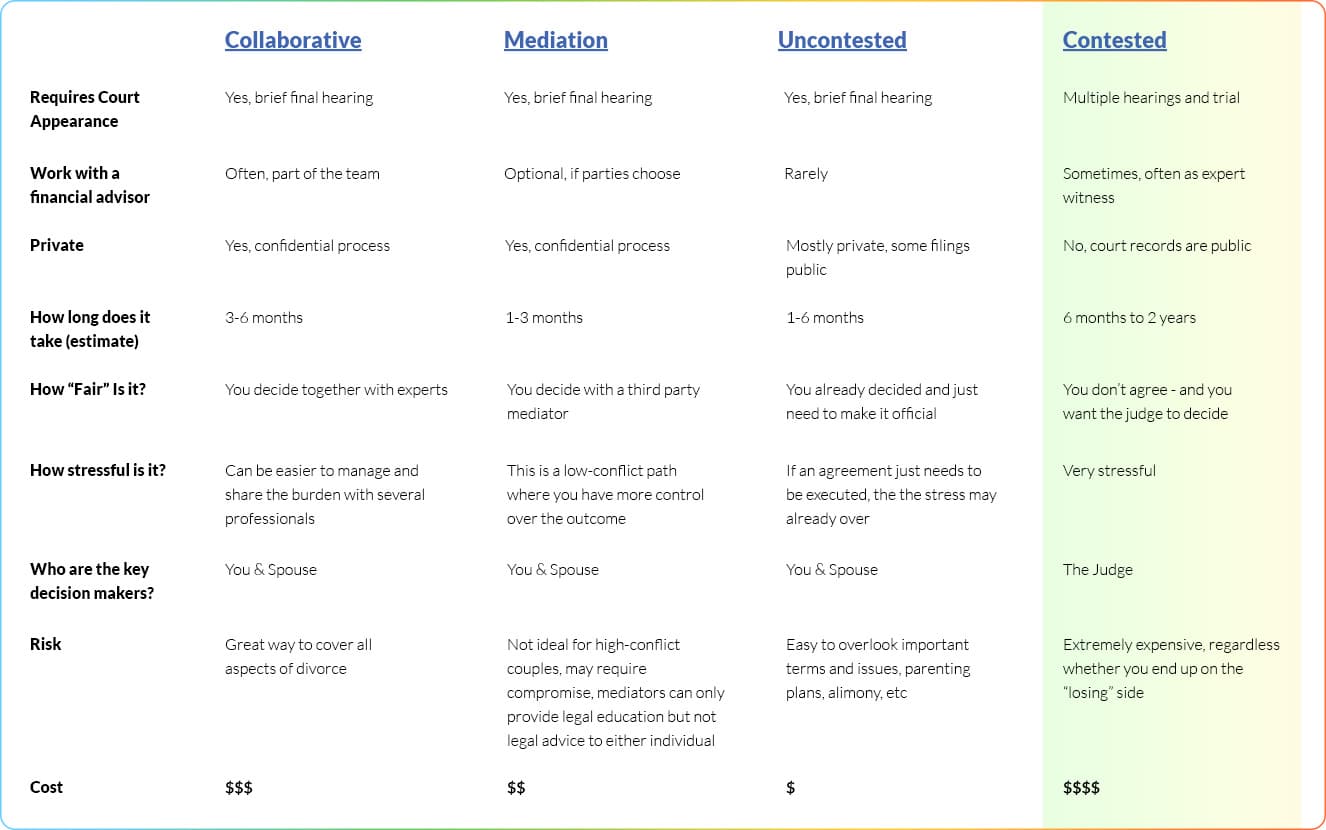Why Choose Contested Divorce?
Nobody goes into divorce hoping for a courtroom battle. It’s what happens when cooperation just isn’t possible. Maybe your spouse refuses to be upfront about money, or you have complicated assets like businesses, real estate, or investments that can’t be split without legal help. Custody battles can also land families in court, especially when parents can’t agree on where the kids should live or how decisions should be made. And in the most serious cases (like situations involving abuse, neglect, or domestic violence), court is often the only safe option.
The upside of a contested divorce is that the court process forces compliance: both sides must share information, and a judge crafts a legally-enforceable outcome. The downside is that it’s public, expensive, stressful, and usually takes much longer than other options. Another disadvantage is placing your family’s future in the hands of a stranger who is overworked and has hundreds, if not thousands, of open cases at any given moment. That’s why contested divorce should be viewed as a last resort when nothing else works.
Advantages Of Going To Court
Most people would rather avoid going to court—and with good reason. The court is public, expensive, and usually takes much longer than other paths. That’s why we encourage couples to try mediation, collaboration, or even an uncontested divorce first. These options give you more privacy, cost less, and allow you to stay in control of the outcome.
But sometimes, avoiding court just isn’t possible. When one spouse refuses to cooperate, hides money, or makes decisions impossible, court becomes the only way forward. In those situations, the courtroom can serve an important purpose:
- The judge can make your spouse cooperate — If your spouse is hiding assets, refusing to negotiate, or dragging their feet, the court has the power to compel action.
- You’re protected — In cases involving abuse, coercion, or threats, the court can step in and make sure you and your children are safe.
- It’s final and enforceable — Once a judge makes a ruling, both sides must follow it. That means no more endless arguments or back-and-forth.
- A decision is guaranteed — If you and your spouse can’t agree, the judge makes the call so you can move forward instead of staying stuck.
Think of court as a safety net. It’s there when cooperation breaks down, but it’s not the first stop. The best outcome usually comes from working things out outside the courtroom whenever possible. Court should be seen as the last resort, not the starting point.
When Court May Not Be Necessary
Court isn’t always the answer. Many couples can avoid litigation by choosing alternative paths that give them more control, privacy, and peace of mind. Some options include:
Mediation — Work with a neutral mediator who helps guide conversations and build agreements without a judge getting involved.
Collaborative Divorce — Each spouse has an attorney, but everyone commits to resolving issues through teamwork instead of fighting in court.
Uncontested Divorce — If you and your spouse agree on all terms ahead of time, you can file paperwork and usually avoid having to attend a final hearing.
These approaches save time, reduce costs, and keep personal details private. Couples who are willing to talk openly, share information honestly, and compromise often find that they can reach an agreement without ever stepping into a courtroom.
How Contested Divorce Works in Florida
- Financial records like bank statements, tax returns, retirement accounts, and business documents.
- Property details if there are homes, cars, or real estate involved.
- Statements under oath, where you may have to answer written questions or sit for a deposition.
How Contested Divorce Works in Florida
- Financial analysts or forensic accountants to track hidden money.
- Property appraisers to determine the fair value of real estate.
- Child custody evaluators or psychologists to make recommendations about parenting plans.
- Who stays in the house during the divorce.
- Temporary custody and visitation schedules.
- Temporary support (alimony or child support) until the case is finalized.
Many courts require the parties to attend mediation before they can bring their issues to the court at a hearing or trial. Given this requirement, plus the immense cost of going to trial, the reality is that most contested divorces ultimately end up resolving at mediation at some point along the line.

What is The Artemis Family Law Approach to Contested Divorce?
At Artemis Family Law, we understand how heavy and uncertain a contested divorce can feel. Questions about your children, your finances, and your future can quickly become overwhelming. That’s why our role is to provide steady guidance, clear communication, and strong representation from start to finish.
Attorneys Teris Deitsch and Paul Shafranski bring years of courtroom experience to every case. We know how Florida judges view custody disputes, property division, and support issues, and we use that knowledge to prepare thoroughly on your behalf. While we always encourage solutions outside the courtroom, we are ready to stand firm when litigation becomes unavoidable.
Our commitment is simple: to protect what matters most to you. That means securing a fair division of assets, making sure your children’s best interests are at the center of every decision, or holding the other side accountable when they refuse to cooperate.
Schedule Your Divorce Consultation
Mediation Frequently Asked Questions

Do I really need a lawyer for a contested divorce?
Yes. Contested divorces involve court filings, strict deadlines, and hearings where evidence is presented. Without an attorney, it’s easy to get overwhelmed or make mistakes that could cost you custody, money, or property.

How long does a contested divorce usually take?
It depends on the complexity of your case, but most contested divorces last six months to two years. Cases with businesses, large assets, or custody battles tend to take longer.

Why is a contested divorce so expensive?
Court fees, attorney time, expert witnesses, and trial preparation all add up. The more hearings and disputes you have, the higher the cost. That’s why we always explore settlement options first—to save you time and money.

What happens if my spouse hides money or assets?
Through the discovery process, your attorney can request financial records, issue subpoenas, and even bring in forensic accountants to track down hidden assets. The court can also penalize a spouse for lying or refusing to cooperate.

Will I have to testify in court?
Possibly. If your case goes to trial, you may need to testify about finances, parenting, or other disputed issues. Your attorney will prepare you so you know what to expect and how to answer questions with confidence.

What if we reach an agreement before trial?
That’s actually very common. Even in contested cases, many couples settle before the final trial. If you and your spouse come to an agreement, your attorney can turn it into a written settlement that’s legally binding.

Can the judge’s decision be appealed?
Yes, but appeals are limited and are very expensive. You usually need to show that the judge made a legal mistake—not just that you didn’t like the outcome. This all adds more time to the litigation process and prevents parties from being able to move on.

How do judges decide custody in a contested divorce?
Judges in Florida make custody decisions based on the best interests of the child. That includes things like each parent’s ability to care for the child, stability of the home, and whether each parent supports a healthy relationship with the other parent. However, it is important to be aware that Florida has a statutory presumption in favor of equal time-sharing for both parents, which is difficult to overcome.

How public is a contested divorce?
Unlike mediation or uncontested divorce, contested divorces are a matter of public record. That means financial documents, testimony, and even custody disputes can become part of the court file, which is public record.





